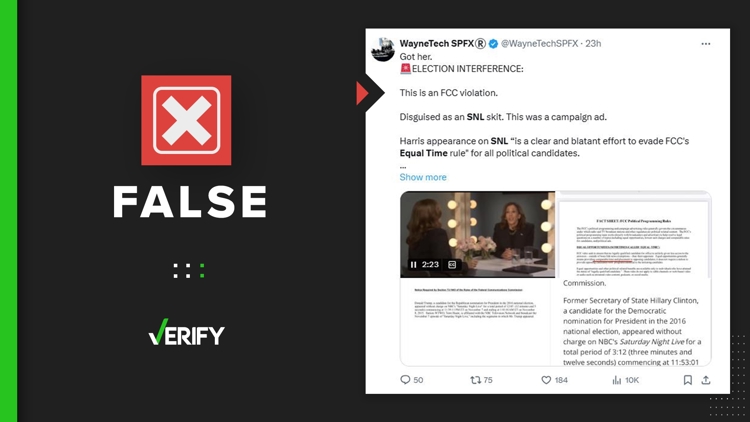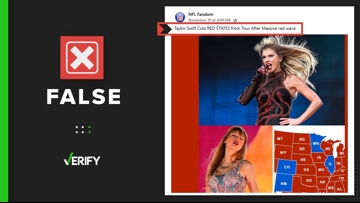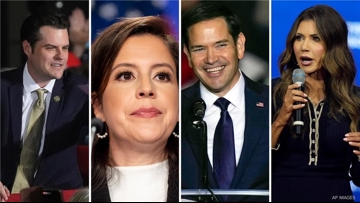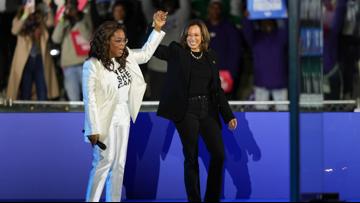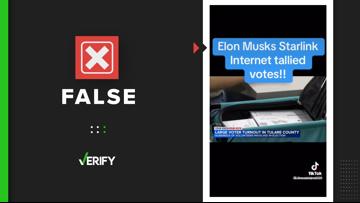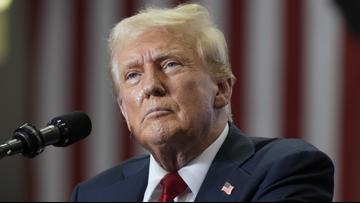On Nov. 2, Vice President Kamala Harris made a surprise appearance on NBC’s Saturday Night Live in a segment with Maya Rudolph, who plays Harris in the show’s comedy skits. Harris’ appearance was during the final two and a half minutes of the show’s opening segment.
Harris’ SNL appearance quickly went viral, and not just among fans of SNL and Harris. One post viewed millions of times on X claimed that Harris’ appearance “breaks FCC rules meant to prevent broadcasters from unfairly influencing voters.” The post referenced a warning from Brendan Carr, a Trump appointee on the FCC’s board of five commissioners, who said that the skit was a “clear and blatant effort to evade the FCC's Equal Time rule.” Other posts also accused SNL of violating FCC rules.
A VERIFY reader texted to ask if Harris’ appearance on SNL was fair.
THE QUESTION
Did NBC violate FCC’s ‘equal time’ rule with Harris’ appearance on Saturday Night Live?
THE SOURCES
FCC spokesperson
Trump campaign spokesperson
THE ANSWER
No, NBC did not violate the FCC’s ‘equal time’ rule with Harris’ appearance on Saturday Night Live.
WHAT WE FOUND
The Federal Communications Commission (FCC) requires broadcasters to grant comparable airtime to opposing candidates if requested by the candidates. NBC satisfied this requirement by granting former President Donald Trump a minute-long appearance the following day.
A Trump campaign spokesperson told VERIFY that NBC reached out, offering to give it the opportunity to satisfy the FCC’s equal time requirements. In response, Trump filmed a direct-to-camera video that aired during NBC’s broadcast of a NASCAR race and again during the postgame show of Sunday Night Football.
The FCC would not act on a potential rules violation unless the Trump campaign submitted a complaint.
“The FCC has not made any determination regarding political programming rules, nor have we received a complaint from any interested parties,” the FCC told VERIFY in a statement.
FCC rules prohibit broadcast stations from allowing a qualified candidate for public office to make an on-air appearance, including by voice or picture, unless the station affords “equal opportunities to all other candidates for that office.” The broadcaster has “no power of censorship over the material broadcast” by the candidate. The rule does not apply to appearances on newscasts. It also does not apply to cable networks; the rule only applies to stations to which the FCC grants broadcast licenses, such as local affiliates of national networks.
By “equal opportunities,” the FCC means that a broadcaster must grant “comparable time and placement to opposing candidates,” according to an FCC fact sheet. The FCC does not require the programs to be identical between the rival candidates’ appearances.
The FCC didn’t require NBC to reach out to the Trump campaign to satisfy the rules, even though that’s what NBC did. The FCC’s rules say that an opposing candidate has one week to reach out to the broadcaster after the first candidate’s appearance. Once a candidate has done that, the broadcaster is then obligated to grant the request.
A candidate can submit a complaint to the FCC if it believes a broadcaster has violated this rule and the burden to prove wrongdoing is on the complaining candidate.
NBC did not reply to VERIFY’s request for comment at time of publishing. NBC told NPR reporter David Folkenflik that it “accommodated the Trump campaign’s request for equal time consistent with our regulatory obligations.”

